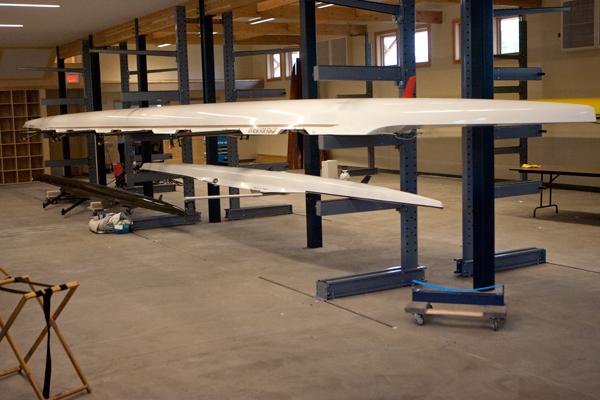The water surface on Cayuga Inlet lies still and serene as fifth-year senior and former crew member Cassidy Goepel carefully steps into a wobbly white boat and straps two oars into the boat’s riggers. Goepel, paddling confidently out to the center of the Inlet, checks over each shoulder to ensure the waterway is clear and begins her solitary practice session.
This smaller boat is known in the rowing community as a scull, and this fall marks the first year sculls will be raced in a women’s varsity sport for Bombers’ athletics.
The new sculling program at the college is only the second varsity sculling program in the United States. The first began at Oklahoma City University in 2007. Goepel is currently the only member of the team because of her previous experience with sculling. The rest of its members will be decided by a 3,000-meter time trial.
The recent addition of sculling to the women’s varsity sports lineup is part of an initiative at the college to add women’s sports in accordance with a gender equity compliance in Title IX, federal legislation put in place to create equal opportunity for male and female athletes. Robinson said there should be a new women’s varsity sport every three to five years.
This year it’s sculling, but other sports were mulled over during Athletic Director Ken Kutler’s difficult decision-making process. After contemplating the merits of equestrianism, bowling, water polo and ice hockey — among others — as a women’s varsity sport, the college’s location and dedicated rowing coaches made sculling the top choice.
“I think this [decision] is a result of having expertise on the staff to be able to coach it, being in an area where we have the facilities to operate,” Kutler said. “Having that knowledge base on the coaching side was more of the driving force for adopting this.”
Sculling is a rowing sport, but it differs from crew — traditionally known as sweep rowing — in several distinct ways.
The biggest difference is in the boat’s power supply. Scullers must learn how to master two oars instead of the one oar that sweep rowers employ and motivate themselves without the use of a coxswain. Women’s crew Head Coach Becky Robinson said the easiest way for people to understand the difference is to visualize the dimensions of a canoe versus a kayak.
Handling two oars instead of one is a major adjustment for team members who have spent years perfecting the sweep rowing technique.
“When they sweep row, one hand stays flat and just pulls,” Robinson said. “The other hand pulls and feathers the oar so the hand turns. It takes awhile to figure that out — kind of like tapping your head and rubbing your belly at the same time.”
Scull rowers must learn how to work with different techniques and equipment to propel their boats while also adjusting to another major change — the boat itself. According to racing shell manufacturer WinTech Racing, a typical competition shell for an eight-person sweep rowing team weighs more than 200 pounds and ranges from 54 to 57 feet long, dwarfing a single scull shell that generally comes in at about 30 pounds and 23 feet long.

The transition from a large shell to a smaller boat with very similar proportions and setup may seem inconsequential, but Goepel said boat size makes all the difference.
“That’s the thing about small boats — they’re very unforgiving,” Goepel said. “You have to be really on your mark or you’re going to flip yourself.”
Aside from the advantages that accompany an additional sporting opportunity, Goepel said sculling and its heavy focus on technique will make for a more well-rounded athlete and sweep rower. She said that while many rowers have power, technique is harder to craft than strength and sculling is a crash course in that technique.
“Power can take you a long way, but if you don’t know how to use it, it’s not worth much,” Goepel said. “Things that I had been lacking for a long time that I just couldn’t figure out just started to click. It translated from the small boat to the sweep.”
The sculling program may pay dividends for the sweep teams, but for now the new scullers will likely be focused on learning how to navigate the smaller boat. However, Goepel said she still expects the scullers to be competitive in their inaugural season.
“We have a lot of focus in the moment. We have a lot of good races lined up,” Goepel said. “I know [the coaches] are going to be fighting to get us wins and really make us the most competitive team out there and build ourselves a niche in the sculling world.”
The Bombers will be competing against an assortment of schools that feature sculling as a non-varsity sport. Bucknell University, University of Massachusetts Amherst, Tufts University and Gates College are the teams on the Blue and Gold’s sculling schedule this year.
As far as competition is concerned, there may be no better year for the inauguration of a sculling team. The region is teeming with new scull programs and the Eastern Collegiate Athletic Conference will hold its very first sculling regatta Oct. 23 on Lake Quinsigamond in Worcester, Mass., for both varsity and non-varsity programs. While this varsity program is brand new, postseason success is in the realm of possibility for South Hill’s fledgling scullers.
Leading by example, Goepel wants to teach some of the new recruits a few of the things she’s learned in the small shell.
“I’m hoping to show that you can always get better,” Goepel said. “Nobody is ever perfect. You can always get better. You can find that self, inner motivation that comes with not having a coxswain, and that can really build on the rest of their life. Motivate yourself.”
Ithaca College gets ready to welcome sculling as its newest varsity sport as part of its gender equality initiative.







